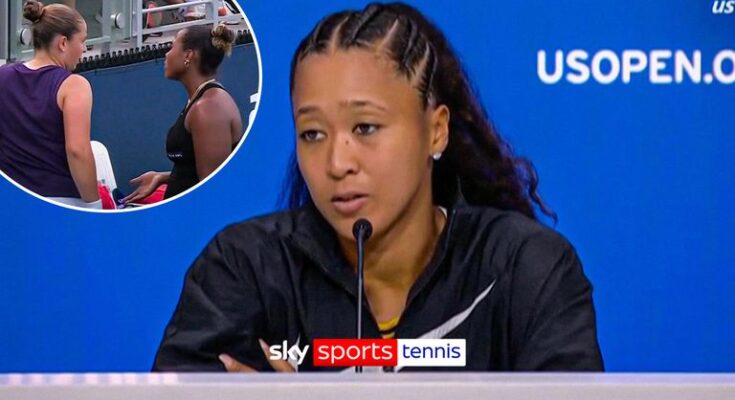Naomi Osaka has always been one of the more thoughtful and candid voices in tennis, someone who balances the competitive fire of being a Grand Slam champion with an ability to reflect on issues beyond the court. When she was asked about the comments made by Jelena Ostapenko to Taylor Townsend following their recent match at the US Open Tennis Championships, Osaka didn’t shy away from offering perspective. The exchange between Ostapenko and Townsend had sparked discussion across the tennis world, with fans, pundits, and even former players weighing in on whether Ostapenko’s remarks crossed a line, were fair within the heat of competition, or spoke to larger issues about sportsmanship. Osaka’s response brought another layer to the conversation, one that emphasized empathy, the importance of mutual respect among athletes, and the emotional intensity that comes with competing at the highest level.
The incident began when Ostapenko, known for her fiery personality on court, lost a tightly contested match to Townsend. After the final point was played and the two approached the net, what should have been a routine handshake turned into an awkward moment. Ostapenko, visibly frustrated, was heard saying comments that some interpreted as dismissive toward Townsend. While she did not launch into a full-blown tirade, her words were tinged with irritation and seemed to undermine the efforts of her opponent, who had played with resilience to claim the victory. Townsend, for her part, handled the exchange with composure, offering her handshake and walking away without escalating the situation. Still, the cameras caught enough to spark headlines, and soon the tennis world was dissecting the interaction, with some defending Ostapenko’s competitiveness and others condemning her perceived lack of grace in defeat.
It was within this context that Osaka was asked about the situation. Her response carried weight, not only because she has been in similar high-pressure moments, but also because she is seen as someone who understands both the emotional toll of competition and the responsibility that comes with being a professional athlete under the spotlight. Osaka explained that while she did not want to vilify Ostapenko—acknowledging that emotions run high after such matches—she did believe that moments like those can shape the way players are remembered and respected. She emphasized the importance of being mindful of how one’s actions and words affect others, particularly in a sport that thrives on mutual respect. Osaka noted that Townsend has worked hard to climb back into the competitive fold, juggling her career with motherhood, and that recognizing the efforts of one’s opponent, even in defeat, is part of what makes tennis such a respected global sport.
Osaka’s comments were careful not to fuel unnecessary drama. She resisted the urge to outright criticize Ostapenko, instead framing the discussion around sportsmanship and the shared experience of being on tour. She pointed out that every player has endured moments of frustration and disappointment, herself included, but that athletes are often defined not just by their victories but by the grace they show in defeat. For Osaka, the incident was an opportunity to highlight the culture of the sport she loves, one where respect should remain a core value even when emotions are raw. Her remarks drew praise from many fans and fellow players, who appreciated her ability to address the situation with honesty while also maintaining a sense of fairness.
One aspect of Osaka’s perspective that stood out was her focus on Townsend. She described Townsend’s journey as inspiring, referencing the sacrifices and challenges she has faced, from balancing motherhood to proving herself repeatedly on the biggest stages. Osaka highlighted how important it is for the tennis world to celebrate those stories rather than diminish them in moments of heated emotion. She implied that Townsend deserved to be recognized for her performance, and that dismissive comments risk overshadowing the resilience and skill that brought her victory. By centering Townsend in her response, Osaka underscored the idea that sportsmanship is as much about uplifting others as it is about controlling one’s own reactions.
The broader conversation about Ostapenko’s comments and Osaka’s response speaks to an ongoing tension in tennis. The sport is known for its individualistic nature, with players carrying the weight of victory or defeat alone on the court. Unlike team sports, there is no buffer of teammates to share in the highs or lows, and the spotlight can feel both illuminating and unforgiving. In such an environment, emotions often spill over. Ostapenko, who has built a reputation for her fiery competitiveness, has had similar incidents in the past, and fans are divided on whether such behavior should be condemned or simply accepted as part of her personality. Some argue that passion is what makes players like her compelling to watch, while others contend that respect should never be sacrificed, no matter the circumstances.

Osaka’s contribution to this debate reflects her own philosophy of balance. She is not without her own history of intense emotions on court, having battled pressure, scrutiny, and mental health struggles while in the global spotlight. Her openness about those challenges has endeared her to many fans, making her voice especially significant in moments like this. When she speaks about empathy, respect, and the weight of words, it resonates because she has lived through the darker sides of professional sports. She has experienced criticism, misunderstanding, and the immense pressure that comes with being a champion, so her call for understanding and accountability carries authenticity.
For Townsend, Osaka’s defense and acknowledgment likely meant a great deal. The American has been working tirelessly to reestablish herself among the elite in tennis, and beating a Grand Slam champion like Ostapenko was a major milestone. To then be met with dismissive remarks could have dampened the celebration. But having a figure like Osaka publicly validate her journey and commend her resilience helps to ensure that her victory is remembered for the right reasons. It reframes the narrative, shifting focus from the negativity of the exchange to the positivity of Townsend’s achievement. In this way, Osaka not only offered perspective but actively contributed to reshaping the story in a more constructive direction.
In the days that followed, fans and media outlets continued to discuss the incident, often returning to Osaka’s words as a guiding framework. The general consensus seemed to be that while Ostapenko’s comments were not the worst outburst tennis has ever seen, they reflected a side of her that has sometimes alienated fans. On the other hand, Osaka’s response reminded many why she is admired not only as a player but as a person. She managed to address the situation without escalating conflict, keeping the focus on respect and understanding. This approach aligns with the role Osaka has taken on in recent years, as both a competitor and an advocate for mental health, equality, and sportsmanship.
The incident also sparked larger reflections on the nature of competition and how athletes handle loss. For some, Ostapenko’s reaction was simply evidence of her fierce will to win, a trait that has fueled her success. For others, it was a reminder that even the best athletes must work on self-control and respect in moments of frustration. Osaka’s input added nuance to this discussion, acknowledging that while emotions are valid, the way they are expressed can have lasting impacts. In a sport where players are constantly under the microscope, those small moments often carry disproportionate weight, shaping narratives and reputations in ways that may endure long after the match is forgotten.
Ultimately, what made Osaka’s comments stand out was their balance of honesty and compassion. She did not excuse poor behavior, but she also did not vilify her peer. She contextualized the situation, highlighted the achievements of the player who might otherwise have been overshadowed, and reinforced the values that she believes tennis should uphold. In doing so, she reminded the tennis world that sportsmanship is not just an abstract ideal but a lived practice, one that must be consciously chosen even in moments of disappointment. Her words carried the kind of wisdom that comes not just from experience on court but from a broader perspective on what it means to be an athlete in the public eye.
As the US Open continued and other storylines emerged, the specific incident between Ostapenko and Townsend began to fade from the headlines. Yet the discussion it sparked, and Osaka’s contribution to that discussion, lingered. It became another example of how athletes’ words and actions can shape the culture of the sport, influencing not only how players are perceived but also how fans and younger athletes learn to approach competition. Osaka’s message, centered on respect, empathy, and recognition, served as a reminder that the battles fought on the court are only part of the story. How players treat each other when the match is over is just as important, if not more so, in defining the legacy they leave behind.
In the end, Osaka’s reflections underscored why she continues to be one of the most respected voices in tennis. By addressing the comments made by Ostapenko with grace and thoughtfulness, she demonstrated the qualities that elevate athletes beyond their physical talents. Her ability to empathize, to consider multiple perspectives, and to emphasize values over drama set an example for others. Whether Ostapenko will reflect on the moment and adjust her approach in the future remains to be seen, but Osaka’s words added a meaningful layer to the conversation. In a sport where emotions, rivalries, and individual personalities often collide, her voice reminded everyone that respect remains the foundation upon which the beauty of tennis is built.



